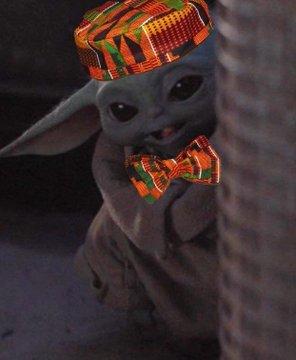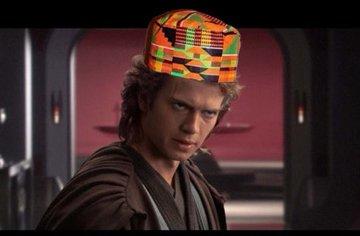This submission is currently being researched & evaluated!
You can help confirm this entry by contributing facts, media, and other evidence of notability and mutation.
Overview
Afrocentrism is a cultural and political movement dedicated to the study and appreciation of black culture, history, philosophy, music and other achievements, particularly of African descent. Afrocentrists aim to highlight and emphasize the contributions of black people throughout the world. Afrocentrism is sometimes associated with controversial organizations such as the Nation of Islam and the Black Hebrew Israelites, which have been accused of anti-Semitism, as well as Black Supremacists and the Black Nationalist movement. While some praise the movement, calling it a vital element of black activism, hoping it raises awareness of black institutions, achievements, history and identity, others have criticized Afrocentrism as "racist" and "reactionary" like Eurocentrism, as well as pointing out many cases of historical revisionism and cultural appropriation from non-black cultures and historical figures.
History
The rise of Afrocentrism began in the 19th century with the writings of black intellectuals like David Walker, Henry Highland Garnet, Martin Delany, Alexander Crummell, and Edward Wilmot Blyden.[1] Following the abolition of slavery, as Black Americans began taking a bigger role in public discourse, some began advocating for a re-evaluation of black contributions to Western society.
However, in the 1960s, writer, historian, sociologist and civil rights activist coined the term "afro-centric" in describing the Encyclopedia Africana as "unashamedly Afro-Centric but not indifferent to the impact of the outside world."[2]
Throughout the 20th century, Afrocentrism has been both a source of credible scholarly study and debate. 1987's The Afrocentric Idea Molefi Asante, one of the most influential texts of the movement, argues for the placing of Africa "at the center of any analysis that involves African culture and behavior." However, as the movement grew, some questioned the historical accuracy of Afrocentrism. The New York Times[3] writes, "certain scholars say some of the information that Afrocentrists want added to the curriculum is erroneous; others say some of the proposed additions are not as significant to the development of human civilization as the weight being afforded them by Afrocentrists." Still, Afrocentrists believe that "a large body of knowledge that has been left out of the curriculum that will not only benefit the African-American population, but all students," says Dr. Alice Morgan-Brown in the Times.[3]
In 1995, Dr. Greg Moses, writing for the National Association of African American studies,[4] argued against the criticism of Afrocentrism:
Afrocentricity is the idea that Africa and persons of African descent must be seen as proactive subjects within history, rather than as passive objects of Western history. Afrocentricity means reestablishing Africa and its descendants as centers of value, without in any way demeaning other people and their historic contribution to world civilization.
In the 2001 book, We Can't Go Home Again: An Argument about Afrocentrism by Clarence E. Walker calls the philosophy "a mythology that is racist, reactionary, essentially therapeutic and is eurocentrism in blackface."[5]
According to Robina Mekenye[7], the 2010s saw a resurgence of Afrocentrism. She writes, "Fast forward to 2018, there has been a resurgence of Afrocentrism across television and film. According to a study conducted by Nielsen in 2017, 73 percent of non-Hispanic whites and 67 percent of white people believe that African-Americans influence mainstream culture […] Amid the resurgence of Afrocentrism, mainstream media in America is embracing black culture in a society where Eurocentric beauty standards and cultural beliefs have traditionally been the norm."
Highlights
Afrocentricity and The Afrocentric Idea
Many consider two books by Molefi Kete Asante, Afrocentricity (1980) and The Afrocentric Idea (1987) to be seminal texts in Afrocentric philosophy.
The Black Athena
1987's The Black Athena by Martin Bernal re-examines ancient Greece from an Afrocentric perspective. However, some intellectuals have debated the validity of Bernal's argument, criticizing his lack of archeological evidence.
Black Panther
The 2018 Marvel superhero film Black Panther is considered, by some, a crucial example of mainstream culture embracing some of the tenants of Afrocentrism. Mekenye writes, "Aside from the records the "Black Panther" has broken, the images brought forth on the screen were told from an Afrocentric point of view. From the natural, protective hairstyles donned by the women in the film to the bold prints of traditional African clothing, the movie exhibited both the aesthetics and cultural ideology American audiences have not seen in the last two decades." As of August 2020, it is the fourth highest-grossing film of all time at the United States domestic box office, not adjusted for inflation, generating more than $700 million.[6]
Related memes
Hotep Kufi Exploitables
Hotep Kufi Exploitables is a photoshop meme featuring an exploitable image of a multicolored brimless cap known as a "kufi," worn by men throughout Africa, Asia and America. The hat, a popular symbol of Afrocentrism and the African diaspora, is sometimes used to represent a performative progressiveness, faux wokeness or authority on issues regarding African American history. Online, particularly on Black Twitter, the hat is often superimposed on to the heads of various people and characters to present them as a parody of Afrocentricity.



We Wuz Kings
WE WUZ KINGZ, also iterated as "KANGZ N SHIET", is an expression primarily used by users of 4chan's /pol/ (politically incorrect) board to poke fun at those who adhere to the Black Egyptian Hypothesis, an often disputed theory which postulates that Ancient Egypt was a black civilization and that some of the most notable royal figures from the Dynastic era were of African ethnicity, including Tutankhamen, Cleopatra and Pharaoh Khafra, who is generally believed to be the face depicted on The Great Sphinx of Giza. In addition to its widespread usage on /pol/, the phrase has been also adopted by detractors of Pan-Africanism on other discussion forums, including white supremacist and nationalist websites.

My Ancestor :)
My Ancestor :) refers to a series of exploitable images image macros depicting a character of a designated ethnicity, species, time period or group looking up towards another character (usually a bust, a sarcophagus or a statue) that does not resemble him/her/it at all, and proudly thinking "My Ancestor :)." Though initially used for race-related jokes, the format evolved to include more parody and nonsensical edits. The template of the meme was inspired by an Afrocentric post on Facebook.

Das Rite
Sometimes spelled "Thas Rite" is an AAVE play on the of the phrase "That's Right" and usually a reference to the Black Hebrew Israelites.

The Black Israelites is a group that claims the ancestry of the ancient Jewish people. The catchphrase originated from a video in which the Israelites are yelling to some people in the streets, often saying "That's right!" to the faces of the pedestrians while insulting them and using racial slurs. One of them openly mocked the Holocaust, calling it a joke, and made a Jewish man cry while saying "Heil Hitler."
Search Interest
External References
[1] Encyclepdia.com – Afrocentrism
[2] Wikipedia – Encyclopedia Africana
[3] New York Times – Afrocentrism: Balancing or Skewing History?
[4] Archive – Afrocentricity as a Quest for Cultural Unity:
Reading Diop in English
[5] Google – We Can't Go Home Again: An Argument about Afrocentrism
[6] The Numbers – Black Panther
[7] USC Storyspace – BLACK IS BACK: THE RESURGENCE OF AFROCENTRISM AND ITS IMPACT ON SOCIETY
Recent Videos 4 total
Recent Images 17 total
Share Pin

















Comments ( 121 )
Sorry, but you must activate your account to post a comment.
Please check your email for your activation code.